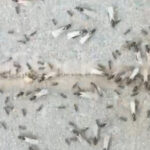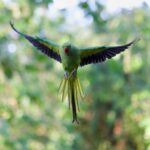
What a Wasp Talk Taught Me – From a Pest Technician’s Point of View
1. Introduction
I deal with wasps almost every day—removing nests in lofts, gardens and wall cavities. So attending a wasp talk dedicated to saving wasps felt strange at first. But hearing Professor Seirian Sumner, behavioural ecologist and entomologist at UCL, made it worthwhile. She’s regularly on TV and in national papers sharing her thoughts on wasps, and her expertise and passion shine through. The event took place at Cholsey Pavilion, just a short drive from Didcot, and packed out with people interested in wasp conservation. What I learnt that night changed the way I view these insects—and made new friends along the way.
2. An Evening at the Cholsey Pavilion
The wasp talk was at the Cholsey Pavilion buzzed with anticipation. Gardeners, local nature lovers, families and even amateur scientists filled the room. I expected curiosity when I admitted I work in pest control, but the reception surprised me. Nobody shunned me. Instead, many welcomed my honest explanation: I only remove nests when they pose a risk—say, near children’s bedroom windows or school entrances.
Everyone seemed keen to learn, share experiences, and discuss ways to live alongside wasps where possible. The atmosphere felt inclusive—despite me wearing a tech badge and boots.
3. Professor Seirian Sumner: Wasps’ Champion
Professor Sumner regularly features in the media—TV programmes, podcasts, national newspapers and interviews highlight her research and unique take on wasps. With infectious energy, she opened the wasp talk and immediately captured the audience’s attention. Myths and cultural biases that unfairly label wasps as villains became her first target. Drawing from her book Endless Forms: Why You Should Love Wasps, she encouraged a complete shift in public perception.
Her enthusiasm struck me. She described wasps as highly diverse (possibly more species‐rich than beetles), understudied, yet vital to ecosystems—and even promising sources for new medicines. The hall listened raptly as she explained their complex social structures, hunting strategies and why their public image lags behind their ecological importance.
4. Why People Fear Wasps
Professor Sumner explained that fear of wasps has deep evolutionary roots. They can sting repeatedly, unlike most bees. Their bold yellow‐black stripes signal danger. Many attacks happen late summer, when wasps get stressed or hungry, reinforcing negative stereotypes.
A single sting in childhood can create life‐long fear. Misunderstanding and lack of education make that fear worse. I’ve met many clients who panic after one bad experience—some even before calling me out.
5. Wasps: Nature’s Pest Controllers and Pollinators
In interviews on ITV and the BBC, Sumner highlights that wasps bluntly consume garden pests—greenfly, caterpillars, aphids, flies—and pollinate many plants, sometimes as effectively as bees. She estimated UK yellowjackets alone eat around 8 kg of prey per colony each season—that’s millions of kilos nationally helping control pests naturally.
Without wasps, we’d likely face more infestations—or greater dependence on chemical pesticides.
6. Bridging Pest Control and Conservation
Hearing Sumner’s message made me reconsider my own role. I protect people, but sometimes I remove nests that could have stayed peacefully hidden. Sumner encourages coexistence whenever possible—especially early in the season or when nests lie far from human activity.
Community members suggested citizen science projects like the Big Wasp Survey, which she co-founded in 2017. These projects map wasp sightings and inform conservation across the UK. Several people from the Wallingford area spoke of contributing to the project. I thought that was brilliant.
7. My Role as a Pest Technician
After the talk, I chatted with a few attendees. I explained that I assess nests before acting. If a nest sits safe in a tree well away from people, I often advise to leave it be. But if a nest perches over an entrance, children’s play zone or narrow pathway—I clear it, because safety comes first.
Pest control doesn’t mean I hate wasps. It means I balance risks, educate customers, and respect wildlife. The crowd appreciated that honesty. Professor Sumner even thanked me for attending and said she values pest professionals who work informed and thoughtfully.
8. Final Thoughts
That evening at Cholsey Pavilion reminded me that even after years in pest control, I can still learn something new. Professor Seirian Sumner made me see wasps not as pests only, but as fascinating beings with vital ecological roles. I took home a deeper respect—for the insects and for the people studying them.
With better public awareness, education and balanced pest control decisions, we can support both human safety and wasp conservation. So, next time you find a nest in your garden, pause. It may not pose a threat. And if it does, know that informed professionals like me will handle it with care, responsibility and a touch more appreciation than before.
🐝 5 Surprising Facts About Wasps from Professor Seirian Sumner
“Why Wasps Deserve More Love Than We Give Them”
1. Wasps Are Natural Pest Controllers
A single wasp colony can eat over 8kg of garden pests in one summer – including aphids, caterpillars and flies.
🪰 Fewer pests = fewer chemicals in your garden.
2. Wasps Are Pollinators Too
Wasps visit flowers like bees do and pollinate many plants. Some species even specialise in specific flowers.
🌼 Without them, biodiversity suffers.
3. Their Bad Reputation Isn’t Entirely Fair
Most stings happen late in summer when wasps get hungry and sugar-deprived. They’re not naturally aggressive – they’re just hangry.
😬 Respect, not fear, is key.
4. Over 100,000 Wasp Species Exist
Most don’t sting humans and many remain unclassified. Wasps may be more diverse than beetles.
🧬 Their potential includes medical and ecological breakthroughs.
5. You Can Live With a Wasp Nest (Sometimes)
If a nest isn’t near people or pets, it often causes no harm and dies off naturally in autumn.
🏡 A calm observation beats unnecessary destruction.




